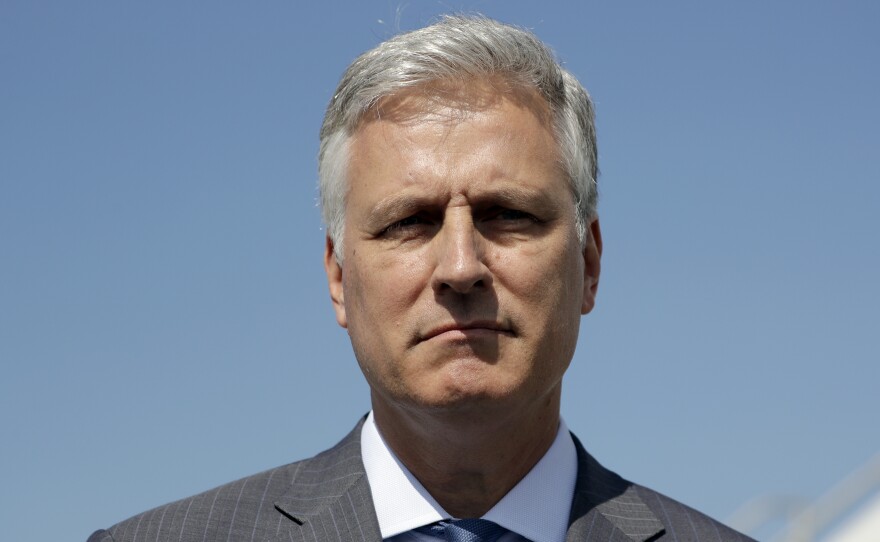Updated at 6:33 p.m. ET
National security adviser Robert O'Brien is defending a closed-door briefing held for lawmakers on Wednesday in which Trump administration officials laid out the justification for the U.S. drone strike that killed Iran's top military commander.
The closed-door briefing by members of the president's national security team has come under bipartisan criticism from lawmakers who say the administration has failed to adequately detail the intelligence justifying last week's killing of Maj. Gen. Qassem Soleimani, the commander of Iran's elite Quds Force.
Addressing that criticism in an interview with Morning Edition host Steve Inskeep on Thursday, O'Brien said the U.S. "had very good information that there were imminent attacks planned against Americans in Iraq and potentially Syria."
O'Brien also reiterated the administration's stance that it will hold Iran culpable for any future attacks on Americans, even those carried out by Iranian proxy forces in the Middle East.
"We've made it very clear that when Iranian proxies that are directed by Iran attack Americans, that we're going to hold the Iranians responsible. And they understand that," he said.
Wednesday's briefing for lawmakers, led by Defense Secretary Mark Esper, CIA Director Gina Haspel and Secretary of State Mike Pompeo, has fueled calls, particularly among Democrats, for a curb on the the president's ability to wage military action against Iran without congressional consent.
Among those who have criticized the briefing is Sen. Mike Lee, R-Utah, who called it "the worst briefing I've seen" on a military issue in his entire nine years serving in the Senate.
Following the briefing, Lee said he would support a proposal by Sen. Tim Kaine, D-Va., to place limits on the president's military authority. A separate measure that would force President Trump to seek consent from Congress before taking new military action against Iran passed the House on Thursday.
O'Brien, who said he was not part of the team that briefed Congress, told NPR he was "disappointed" by Lee's characterization, adding that he heard from other lawmakers that it was received quite well.
"I think there's there's always mixed reviews on these things," said O'Brien.
Lee told NPR that his frustration was not over Soleimani's killing, but over what he described as an unwillingness by administration officials to discuss "the possibility of future military action against Iran."
"And it was on that topic they refused to make any commitment about when, whether and under what circumstances it would be necessary for the president — or the executive branch of government — to come to Congress seeking authorization for the use of military force," he said.
One question the administration would not engage on, Lee said, was a hypothetical about whether it would ever undertake a strike against the Supreme Leader of Iran, Ayatollah Ali Khamenei.
"The fact that there was nothing but a refusal to answer that question was perhaps the most deeply upsetting thing to me in that meeting."
O'Brien told NPR "we never answer those sorts of hypotheticals," particularly when they involve sensitive military operations. "So, for example, when President Obama took out Osama bin Laden, those things don't happen with pre-briefs to Congress. But we made certain in this case that Congress was made aware of the military operation against Soleimani immediately after it happened."
O'Brien defended the intelligence that led to the strike against Soleimani, but when pressed on whether officials knew details of the "imminent" attack cited by the administration — details such as time and place — O'Brien responded, "You never know the time and place of these things with perfect particularity."
Without elaborating, O'Brien said possible targets of the attack included "Both diplomats and soldiers, sailors, airmen, Marines."
"I've seen the intelligence and it was incredibly strong intelligence. There are a lot of people that want that intelligence released," O'Brien said. "You know, look, I wish we could, but at the same time, we don't want to compromise sources and methods that allow us to protect Americans."
The Trump administration ordered the strike on Soleimani following a Dec. 27 attack on a military base in Iraq by an Iranian-back militia. That attack killed an American contractor and wounded several other Americans and Iraqi personnel.
"The president made it very clear that if you harm Americans, if you kill Americans, you'll be held responsible," O'Brien said.
Iran responded to the attack early Wednesday morning local time with missile strikes on two bases housing U.S. troops in Iraq. No casualties were reported, but the back-and-forth led to fears that Tehran and Washington were on the verge of a full-scale war.
Those fears appear to have eased somewhat. Iran's U.N. ambassador, Majid Takht Ravanchi, told NPR the attack was "a measured, proportionate response," adding that "As far as Iran is concerned, that action was concluded last night."
Copyright 2020 NPR. To see more, visit https://www.npr.org.






